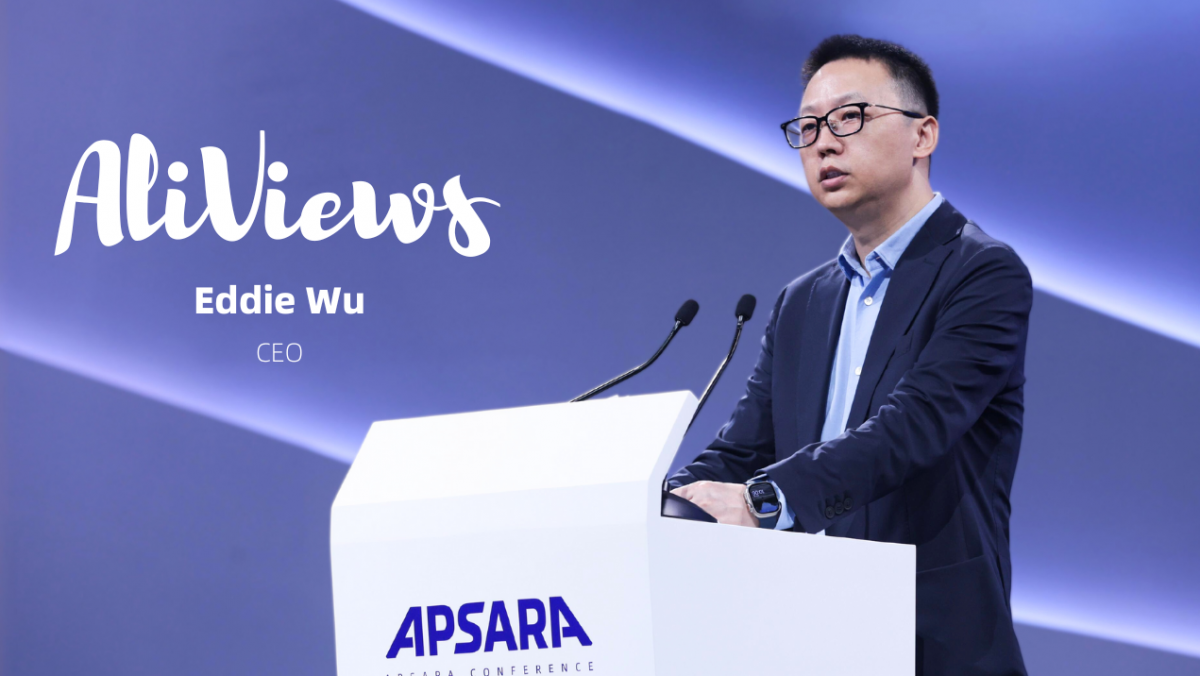
Alibaba Group CEO Eddie Wu speaks at the 2024 Apsara Conference in Hangzhou. Photo credit: Alibaba Group
Alibaba Group CEO Eddie Wu speaks at the 2024 Apsara Conference in Hangzhou. Photo credit: Alibaba Group
Alibaba Cloud’s annual flagship event, Apsara Conference, kicked off today. Eddie Wu, Chairman and Chief Executive Officer of Alibaba Cloud Intelligence, delivered a keynote speech sharing the company’s perspectives on AI development.
Welcome to the 2024 Apsara Conference. This past summer, Alibaba Cloud helped the Paris Olympics achieve a historic milestone where cloud computing surpassed satellite technology as the primary means of Olympic broadcasting for the first time. AI was also employed extensively in the Games for the first time.
Today, AI is the focal point of our Apsara Conference, and I’d like to take this opportunity to share three main perspectives.
First, the pace of AI development over the past 22 months has surpassed any historical period, yet we remain in the early stages of the AGI transformation.
Large model technology is rapidly iterating, significantly enhancing its usability. Large models now possess multimodal capabilities encompassing text, speech, and vision, enabling them to execute complex commands.
Last year, large models could only assist programmers in writing simple code; today, they can directly comprehend requirements and complete complex programming tasks. While their mathematical prowess was at a high school level last year, it has now reached a level comparable to Fields medalists. They are nearing proficiency at levels equivalent to Ph.D. degrees in disciplines such as physics, chemistry, and biology.
The cost of model inference has decreased exponentially, outpacing the cadence of Moore’s Law. In the past year, the price of Qwen API on Alibaba Cloud’s Model Studio has dropped by 97%. The lowest cost for deploying a million Tokens is now just RMB 0.50. The cost of inference is a critical factor for application proliferation, and Alibaba Cloud will continue to further reduce user costs.
The open-source ecosystem is thriving. In June this year, Qwen’s open-source Qwen2 swiftly topped Hugging Face’s global open-source model rankings. On Hugging Face, there are nearly 50,000 native and derivative models of Qwen, ranking second globally (in terms of model number). The ModelScope community of Alibaba Cloud hosts over 10,000 models and serves more than 6.9 million developers.
This is only the beginning. To achieve true AGI, the next generation of models must possess a larger, more universal, more generalized knowledge system, and more complex and multi-layered logical reasoning capabilities. The threshold for building the world’s advanced models and staying competitive will reach billions or even tens of billions of U.S. dollars. The path for AI to possess creative abilities and help humans solve complex problems is clear, unlocking the potential for AI’s broad application across various industries and scenarios.
Second, the most significant opportunity for AI lies beyond smartphone screens; AI will take over the digital realm and transform the physical world.
We cannot confine our view of the future to the perspective of mobile internet alone. The most significant potential of generative AI is not in creating one or two new super apps for mobiles but in taking over the digital world and altering the physical world.
Over the past three decades, the essence of the internet revolution has been connectivity — linking people, information, commerce, services, and more, enhancing global collaboration efficiency, creating immense value, and reshaping lifestyles. Generative AI, however, improves productivity by adding intelligence, thereby creating even greater intrinsic value for the world. This value creation could be ten or even a hundred times that of the value of mobile internet’s connectivity.
We believe that generative AI will gradually permeate and eventually control the digital world, with most aspects of the physical world acquiring AI capabilities and forming a new generation of products that connect and synergize with the AI-driven digital world.
For a long time, the focus of AI has primarily been on simulating human perceptual abilities such as natural language understanding, speech recognition, and visual recognition. The rise of generative AI has brought about a qualitative leap; AI is no longer limited to perception but has demonstrated the power of thinking, reasoning, and creation for the first time.
Generative AI has given the world a universal language — the Token. It can represent any text, code, image, video, or sound. AI models can understand various aspects of the real world by tokenizing physical world data, such as human actions like walking, running, driving, using tools, as well as skills in painting, composing, writing, expressing, teaching, and programming. After understanding, AI can mimic humans executing tasks in the physical world. This will usher in a new industrial revolution.
We are observing this transformation in the automotive industry. Previous autonomous driving technologies relied on humans writing rule-based algorithms with hundreds of thousands of lines of code, but they could not cover all driving scenarios. After end-to-end training with large models, AI models directly learn from vast amounts of human driving visual data, endowing cars with driving capabilities surpassing most drivers.
Robotics will be the next industry to undergo massive change. In the future, all mobile objects will become intelligent robots — be it factory robotic arms, construction cranes, warehouse handlers, firefighting robots, or household pets.
In the future, factories will abound with robots producing robots under the command of AI large models. Just as every urban family currently owns a car, each family may soon have two or three robots.
One can envision an AI-driven digital world interconnected with a physically capable world, significantly boosting global productivity and revolutionizing the operational efficiency of the physical world.
Third, the evolution of AI computing is accelerating and becoming the dominant force in computing architecture.
Restructuring of the digital and physical worlds by generative AI will fundamentally alter computing architectures. The CPU-dominated computing paradigm of the past few decades is rapidly transitioning towards an AI-centric one led by GPUs. In the future, almost all software and hardware will possess inferential capabilities, with their computational cores primarily consisting of GPU inference engines combined with CPU processing engines.
We have seen that over 50% of new computing power demand stems from AI, and AI computing needs are at the forefront of demand. This trend is set to grow exponentially. Despite Alibaba Cloud’s substantial investments in AI computing capacity over the past year, it still falls short of meeting our customers’ voracious demand.
All customers and CTOs we engage with today are reshaping their products using AI. A significant portion of new demands is powered by GPU computing, and many existing applications are being reprogrammed for GPUs.
AI computing is rapidly penetrating sectors such as automotive, biopharma, industrial simulation, weather forecasting, education, enterprise software, mobile apps, and gaming. Across industries, an unseen new industrial revolution is quietly unfolding.
Every sector requires more powerful infrastructure that is larger in scale and better suited to AI’s demands.
Alibaba Cloud is investing, with unprecedented intensity, in the research and development of AI technology and the building of its global infrastructure.
Our single-network clusters have expanded to the level of tens of thousands of clusters, and we are rebuilding future-oriented advanced AI infrastructure from chips, servers, networks, storage, to cooling, power supply, and data centers.
Historically, people often overestimate the short-term impact of technological revolutions while underestimating its long-term implications. During the early stages of new technology adoption, with low penetration rates and no personal experiences to draw upon, skepticism is natural. This technology will grow despite your skepticism, and you risk missing out on significant trends if you hesitate.
Standing at the dawn of the AI era, I am truly excited. Many entrepreneurs and scientists from the fields of large models, autonomous driving, and robotics have joined us here today. They are racing ahead, reconstructing our world with AI, and I eagerly look forward to their insightful presentations.
Thank you all. I hope you have a fulfilling and enjoyable Apsara experience.
This article was originally published on Alizila.
NTU Singapore and Alibaba Group Launch Corporate Lab to Advance Green Digital Technologies

1,077 posts | 265 followers
FollowAlibaba Cloud Community - October 9, 2024
Alibaba Cloud Community - December 9, 2024
Alibaba Cloud Community - September 19, 2024
Alibaba Cloud Community - July 23, 2024
Alibaba Cloud Community - October 10, 2024
Alibaba Cloud Community - June 14, 2024

1,077 posts | 265 followers
Follow AI Acceleration Solution
AI Acceleration Solution
Accelerate AI-driven business and AI model training and inference with Alibaba Cloud GPU technology
Learn More Tongyi Qianwen (Qwen)
Tongyi Qianwen (Qwen)
Top-performance foundation models from Alibaba Cloud
Learn More Alibaba Cloud for Generative AI
Alibaba Cloud for Generative AI
Accelerate innovation with generative AI to create new business success
Learn More Platform For AI
Platform For AI
A platform that provides enterprise-level data modeling services based on machine learning algorithms to quickly meet your needs for data-driven operations.
Learn MoreMore Posts by Alibaba Cloud Community